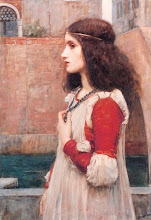 Romeo says that because of his dementia, the things he uses routinely must be in plain sight. This includes toiletries. The counter by his bathroom sink is cluttered with numerous packets of dental floss, three different types of soap, an assortment of tubes of various lotions and creams, and three different toothbrushes, to name only a few examples.
Romeo says that because of his dementia, the things he uses routinely must be in plain sight. This includes toiletries. The counter by his bathroom sink is cluttered with numerous packets of dental floss, three different types of soap, an assortment of tubes of various lotions and creams, and three different toothbrushes, to name only a few examples.What Romeo doesn't know (well, he does now) is that periodically, as the number of his lotions and potions grew, as they began to take over my half of the bathroom counter, I put most of them away in his glass-fronted cabinet. And why not? He would ask, "Have you seen my first aid cream?" I would lift it off of the counter and hand it to him. He was surprised, of course, to see that although it was right in front of him, he couldn't see it. So much for his argument that he needs things in front of him to find them.
Now that Romeo has been living away from home for two months, I am beginning to declutter his clutter. Plugging away at making life here simpler for me. There is a long way to go, but I did not begin with the bathroom.
The first job I tackled is the top of Romeo's dresser. This is a relatively easy task. Put books on the bookshelves. The list of titles tears at my heart:
- Evolve your brain: the science of changing your mind, by Joe Dispenza, D.C.
- Making a good brain great: the Amen Clinic program for achieving and sustaining optimal mental performance, by Daniel G. Amen, M.D.
- A better brain at any age: the holistic way to improve your memory, reduce stress, and sharpen your wits, by Sondra Kornblatt
- The brain trust program: a scientifically based three-part plan to: improve memory, elevate mood, enhance attention, alleviate migraine and menopausal symptoms, boost mental energy, by Larry McCleary, M.D.
The next step in decluttering Romeo's dresser top is putting away the CDs. Just a handful, really: Beethoven, Bach, Amici, Deva Premal, and a self-hypnosis exercise on dressing recorded several months ago by a friend especially for Romeo. Although Romeo saw no improvement in his ability to dress himself, I certainly did. I encouraged him to play it often.
Next to come off the dresser is a stack of handwritten notes and a notebook: random thoughts, instructions for writing memoirs, notes from the Brian Swimme discussion group we participated in for a number of years. These I move into the study, place on a bookshelf, waiting to be better organized once I start the detailed decluttering work in the study.
I find miscellaneous items: a magnifying glass that I put in his desk drawer, a flashlight that I put in the drawer of my nightstand, pens and paperclips and paperweights that go in the study, a purple speckled round box I painted for him a year and a half ago when I took my grandsons to a paint your own pottery place. There are framed photos of Romeo's spiritual teacher, Osho. Romeo does not want them on his nightstand in his room in the nursing home, so I put them in the study for now. Later I will have to decide -- we will decide together, when that makes sense -- what to do with his bric-a-brac in the study, what to do with his pens and books and bookmarks, the elephant statue, his tapes, photographs. I suspect that much of it will end up in boxes in the storage room. But for now, I want to see all of it in front of me. Romeo is still living, although we are not living together.
Lastly, a couple more things on Romeo's dresser: two decorative wooden birdhouses that he painted and decorated last spring when he attended an adult day care program. These I put in a place of honor in the china cabinet we use as a dresser in our bedroom, my bedroom now. And while I'm at it, I gently fold a few sweaters he haphazardly stuffed onto its glass shelves last spring. I'll take them to him in the autumn, when the air turns crisp and cool.
Ah, on the floor is the humidifier Romeo liked to run during the winter. Although there is a humidifier on the furnace, Romeo liked a bit more humidity. I don't need it, so I stash the humidifier in the storage room.
I survey my work. The dresser top is now clear, except for a lamp. Before Romeo moved in with me, there was no dresser there at all. Instead, a bistro table and two chairs with that same lamp. I consider moving the dresser out and bringing in the bistro table and chairs again. But no, the dresser will stay where it is. I need it for Romeo's out-of-season clothes. It stays.
Then I turn around and see on the narrow wall behind me -- the wall that signals the bump-out that houses Romeo's dresser -- I see Romeo's dressing gowns hanging on the hooks I installed on that wall. (An aside: this is the only evidence in my speech that I am married to a British gentleman. I now say dressing gown instead of robe.) He could never find his dressing gowns in the closet, so I consented to the hooks.
But now, I can't think of moving the dressing gowns, of removing the hooks. Too tired, too drained to deal with that now. Later, tomorrow, next week, whenever, I will put the dressing gowns in the closet. I will take the hooks down, spackle the holes, and finish the job with touch-up paint. But not now. Now I will sit silently for a while. Now, with the clutter gone, there is room, there is space for my sadness.





No comments:
Post a Comment